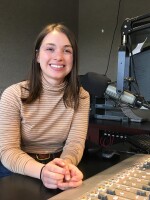The Utah Legislature’s Tax Restructuring and Equalization Task Force met recently for its second study session. This time, lawmakers focused on education funding.
Legislators and policy analysts got to the heart of what Heber Republican Rep. Tim Quinn has described as a “revenue imbalance” at last week’s tax task force meeting. State lawmakers have pointed to a depleting general fund, which relies on sales tax to fund everything from social services to roads. The education fund, which is funded by income tax revenue per the state constitution, continues to grow.
Of the $6.2 billion in public education revenue in 2018, 55% came from the state, while 38% came from local sources and 7% from federal funding. Compared to national averages, analysts say the state disproportionately foots more of the bill for public education, while local sources lag. Rep. Joel Briscoe, one of two democrats on the task force and a former teacher, pointed to the Park City School District. He says when he used to represent a section of Summit County, voters there understood all their state income tax was spent in other school districts.
“They're the only district that generates the weighted pupil unit funding with their property tax, and some of their property tax, I think, also goes on," Briscoe said. "All their income tax goes to other school districts to fund other children.”
Utah routinely comes in last place nationally in per pupil spending, but legislative analysts say over the last five years, lawmakers put an additional $1.4 billion into school districts. If districts want more, then they could increase their local property taxes to the allowed capacity, and that could add another billion dollars statewide. Task force chair and House Minority Leader Francis Gibson says blaming the state for its last-place status isn’t a fair characterization, given the proportion of funding it contributes.
“I think it illustrates that the locals aren't doing as much as they could, either,” Gibson said.
Analysts also presented policy options to consider, ranging from keeping the constitutional earmark on income tax revenue to removing it so that revenue could be used on any state expense. In between the two options, legislators could also vote to allocate some funds from the education budget toward social services. Quinn said instead of making exceptions to the constitutional rule, he wants to remove it.
“If we can do all this moving, let's just have a serious conversation about removing the firewall and not play these what I think are shell games with the money," Quinn said. "We would accomplish the same thing, but to me, let's just be honest with the people, and say, 'this is what we want to do, and this is why we want to do it.”
Amending the state constitution would require two-thirds support in the legislature and a majority vote by the public. Park City Education Foundation Executive Director Abby McNulty recently told KPCW she believed removing that constitutional earmark on income tax revenue for education would reinforce the state’s funding problem.
"The problem is, in my mind—this is just me, Abby McNulty, citizen and parent—is that our state is already underfunding education, and there is a constitutional amendment that requires income tax to support education," McNulty said. "If they remove that, I worry that there will be an opportunity to continue to underfund education."
The task force previously discussed restoring tax reform options such as restoring the full tax on unprepared foods; reducing income tax; and implementing tax credits for certain populations. The group’s next meeting is scheduled for Sept. 19.




